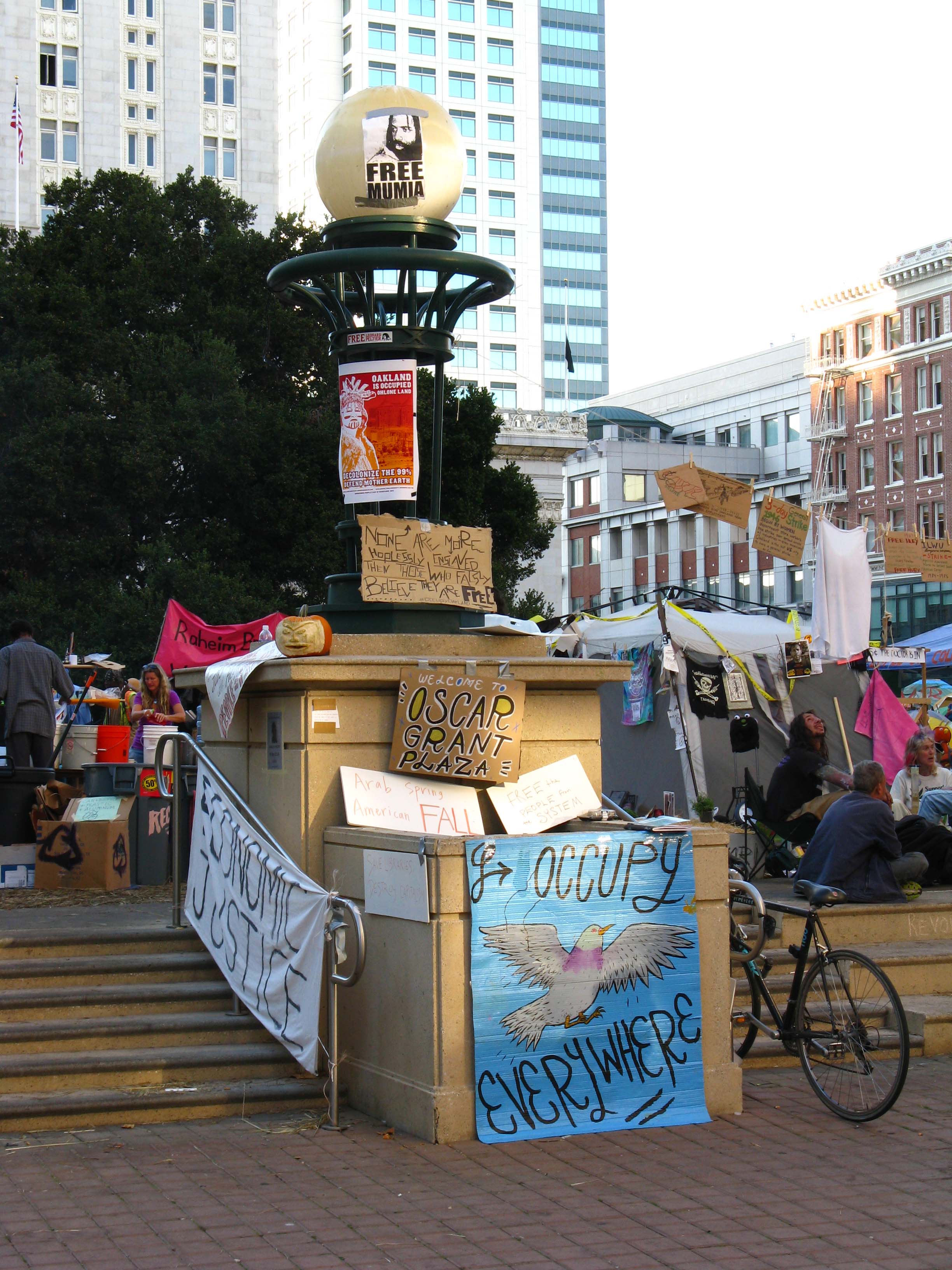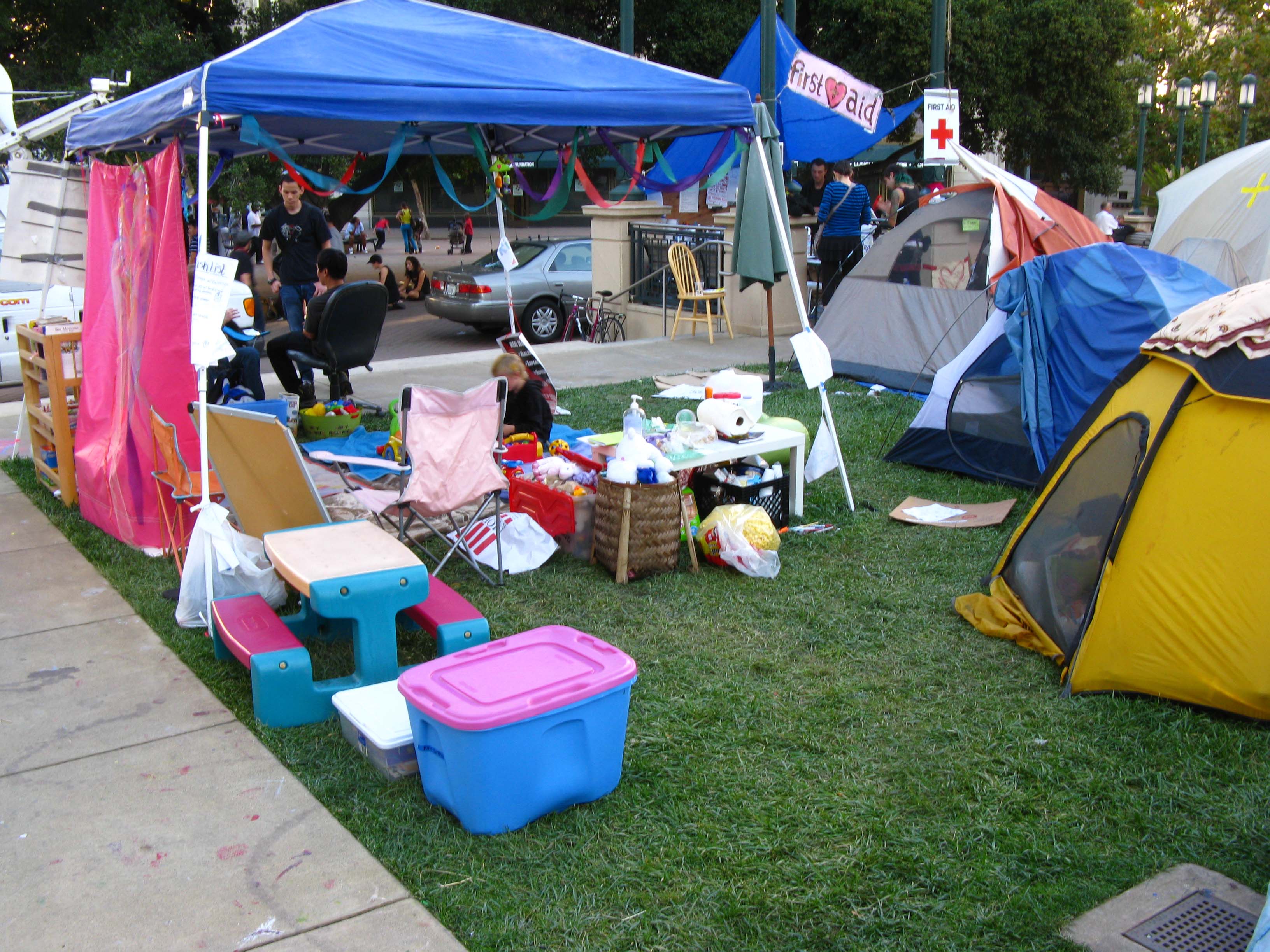by Andrew Lichterman

Oscar Grant Plaza, Occupy Oakland
Early Tuesday morning, hundreds of police officers descended on the Occupy Oakland encampment, driving campers from their beds. The police arrested those who stayed, gassing some and shooting others with “non-lethal” projectiles. Their property was confiscated, the small temporary village, with its kitchen and library, medical tent and children’s area, was destroyed.

Children’s play zone and medical tent, the kind of threats to public order that required hundreds of heavily armed police to subdue.
But that was just the beginning. When Occupy Oakland residents and supporters attempted to reclaim the plaza– with a march that from most reports appeared, with the exception of scattered incidents, to be nonviolent on the part of the protesters– police responded with overwhelming force. It is clear that large quantities of tear gas and various “nonlethal” rounds were fired at unarmed civilians. I was not there Tuesday night. But I would note that I have been present at many, many demonstrations, including a number that involved objects thrown at police in which the police response was considerably more restrained. I find it difficult to believe in this case that police officers, present in very large numbers, armed and in full riot gear, ever were in significant danger from the demonstrators. It seems more likely that those who decided to deploy the kind of force we saw Tuesday wanted to send a strong message, and perhaps one that would be heard beyond Oakland. (more…)
by Andrew Lichterman
These are some reflections on the occupations, having spent time at several and followed many others from afar. The occupations share similarities, but also have local characteristics. I can not speak for any or all of them, but as a participant in the debate they have sparked I can speak, and that is the point. This is some of what I have heard, and some of what I want to say. It is not a time to speak with one voice. The conversation is only beginning. The more it grows and the longer it goes on, the more reason for hope.
Occupy everywhere: reclaiming public space
The occupation movement is a response to internal colonization, to a sense that there is no space in our cities and towns and lives that has not been invaded by immense organizations in which we have no voice. In most aspects of our lives we are commanded or exploited, presented with pre-made, limited choices or no choices at all. And even that is only if our existence is either useful or profitable to the huge organizations that control both the necessities of existence and most social space, real and virtual. If we are neither useful as workers nor profitable as consumers, we are thrown away, pushed aside, squeezed out. Soon there will be no place left to go.
A popular trope used by the mainstream media and in professional political circles to denigrate the Occupy movement is to express puzzlement about “what those people want,” to say they have no “demands.” Yet the immediate “demands” of these occupations are clear. The first is that we have the right to reclaim public spaces (regardless of their legal definition) for their rightful purposes, which are the discussion necessary for the construction of communities that are fair, democratic, and work for all of us, and for the physical activity of constructing such a community. The second demand, equally important, is not really a demand but a call, addressed to all who hear in their capacities as human beings. It is “join us.” It is a call that appeals first to all of us who are politically homeless in the current order of things, who lack the wealth or the position in an increasingly rigid, polarized, and inequitable society to have a voice.
The political classes–government officials elected or appointed in or out of uniform, party operatives, NGO professionals, propagandists masquerading as reporters and analysts in the corporate-owned media– can not–will not–hear either the demand or the call. They cannot hear the call because it is not addressed to them as they demand to be addressed– in their status as officers, officials, or professionals. The demand for the moment only says to those who insist on their roles and prerogatives in the machinery of destruction: you have done enough damage. Leave us alone, while we figure out what to do about it. This demand leaves no place for them so long as they remain within their well-paid roles and does not pay homage to their status, so they refuse to hear it.
The call, on the other hand, addresses people differently and presents us with different choices. For those with no organized power or voice, the choice is: remain silent, and sooner or later one or another of the immense organizations that dominate the life of this planet will take what little you have left. The system we inhabit is inexorably using up the world, and those in the upper echelons of organizations deploying great power plan to be the ones who remain comfortable as long as there is comfort to be had. For those with some measure of power, privilege, and status, the choice is: Come down from your office towers and out of your fortresses, shed your uniforms and your suits, your guns and badges, abjure all claims to status and privilege. Begin with us a new conversation about how we can make a democracy, and how we can find a different path forward for a society gone terribly wrong. Here you can claim to be no more than one more human being with one voice, but also will be no less. (more…)
by Andrew Lichterman
I’m here in Washington D.C. with my Western States Legal Foundation colleague Jackie Cabasso for a number of events, all potential strands in a movement bringing together those working for peace, for a more equitable and ecologically sustainable economy, and for a political system in which every person genuinely has an equal voice.
We spent the weekend at the New Priorities Network planning meeting. That network focuses on bringing together coalitions at the local and regional level to raise awareness of the impacts of war and military spending and inequitable economic policies on the ability of state and local governments to provide for the basic human needs of their residents. Those attending represented local and national organizations throughout the country, and there was a general feeling that the frozen politics of the past two decades is beginning to thaw–from the bottom up.
Thursday we will be joining what likely will be thousands of others at the peaceful occupation of Freedom Plaza here in the District of Columbia. Although we must return to California at the week’s end, we hope that occupation will build on the momentum generated by the Wall Street occupations and those that already are following from it.
We have prepared a short piece on the place of nuclear power and nuclear weapons in the context of the broader global political, economic, and ecological crisis; a pdf version can be obtained by clicking the link: Nuclear Connections: Weapons and Power in the Age of Corporate Globalization.


